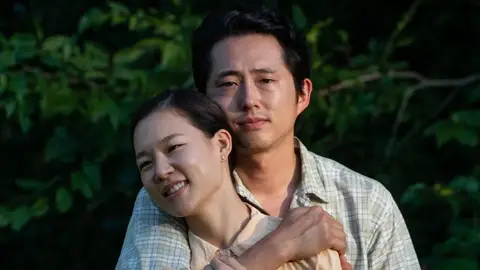‘Minari’ Nails What True Asian Representation Looks Like

Twenty seconds. It took all but 20 seconds for Minari to choke me up. By the second viewing, I was a bawling, sobbing pile of emotions. And that was just from watching the trailer.
Discourse about racial representation in films can feel fatiguing. We get it; #OscarsSoWhite has been in our zeitgeist for over five years now and with the Golden Globes' recent snub of I May Destroy You, not much has changed.
But something about Minari feels different.
Written and directed by American-born Korean Lee Isaac Chung, this 2021 quasi-biographical story is an earnest and gritty look at Asian assimilation, unpacking what the pursuit of the American Dream really means.
With a couple Sundance Film Festival awards and a (problematic) Golden Globes' nomination for Best Foreign Language Film under its belt, Minari follows a Korean family moving to an Arkansas farm in the '80s.
We intimately witness their trials and tribulations; from the realisation that they've uprooted their entire lives for a house on wheels to their fear of being stuck in the gruelling line of work of chicken sexing (the process of identifying a chicken's sex, in case you didn't know). Amid these moments of panic we see the father of the family Jacob Yi (Steven Yeun) determined to prove his worth to his family. "Daddy's going to make a big garden," he promises. "[Our kids] need to see me succeed at something for once," he later tells his wife, Monica (Yeri Han).
As I sat watching Minari in the socially distanced cinema with my sisters on either side of me, it was only the audience reactions that felt out of place.
I would freeze up anytime the Yi family encountered white people, waiting with bated breath for some act of racism to transpire. When racist jokes were inevitably made towards the two kids and the predominately white audience laughed, it felt wrong. It was like they were laughing at the kids; like they were laughing at me.
To them, Minari was just a story. Even in the bathroom stalls, one woman remarked to her friend: "Minari (the Korean vegetable that gives the film its namesake) is just like parsley!" (As Monisha Rudhan notes, "The appreciation of Asian people is so often filtered through Western tropes, as if a spoonful of comparison or adjacence to whiteness is needed to help the medicine go down.)
But for many children of immigrants, Minari is a gut-wrenching watch. Being a first-generation Australian with Chinese parents, I've seen my own parents sacrifice so much for us kids. Working less-than-glamorous jobs, never travelling overseas and foregoing almost every luxury is, for many Asian diaspora, par for the course.
So why is an overwhelming amount of content being created that chooses to disregard this common experience and instead, purport the exact opposite? Think Crazy Rich Asians and Bling Empire, two recent popular watches that entertain through encouraging the voyeuristic consumption of East Asian wealth.
There's an appetite for caricatures of Asians; there always has been. It was more overt with Mickey Rooney's minstrel-like portrayal of Mr Yunioshi in Breakfast At Tiffany's and Sixteen Candles' Long Duk Dong, but minimising Asian characters for entertainment value is far from a lapsed practice.
That's why honest films like Minari are so important. It doesn't give you feel-good, glitz and glamour on a platter like its shiny predecessors. Like Lulu Wang's recent film The Farewell, or closer to home, Michelle Law's Single Asian Female, the movie unsurps Asian stereotypes, bringing a much-needed depth and complexity to Asian characters and culture.
It's this authentic representation that yields those gold nuggets of recognition; moments that made me tug at my sister's sleeve and whisper, "Wait, we have that at home too!"
For me, the subtle nuances in the décor and mannerisms of the family members is what makes Minari stand out; the film moving beyond the easily digestible red finishes and chopsticks that Western audiences are so accustomed to seeing on screen.
There's one scene that shows Monica remove earwax from her son's ear while he lays with his head on her lap, a white tissue neatly folded into a square waiting for the discarded earwax. As gross as it may sound, this practice (called gow hee in Teochew) is a familiar and intimate practice from my childhood. Seeing it on the big screen made my jaw drop.
We also see the Yi family use colourful plastic water ladles and buckets when washing their hands or their hair. I remember these ladles from my visits to my grandparent's house, which ran on well water.
Minari is almost uncomfortable in its accuracy. When the credits started rolling I found myself fixed to my seat, tears streaming, when the woman behind me chirpily said to her friend, "Well, that was something different". They then went on to say, and I quote: "I liked all the Korean stuff".
But the movie strikes that balance of being inimitably personal yet universal in its shared themes of love, hope and faith. ('Korean stuff' notwithstanding.) The unison gasps and cries of the audience alone showed me that. I walked away from the film with no one favourite character; all are deeply flawed yet lovable – you know, what humans are like. Regardless of circumstance and ethnicity, regardless of if your house is on wheels or if you look at chicken butts for a living, we all just want to know if we're doing alright.
And Minari promises just that.
Written by Maggie Zhou, a Melbourne-based writer and typical Gen Z media slashie. Find her words in MTV Australia, Fashion Journal and Broadsheet, or follow her on Instagram @yemagz.
More good stuff:





